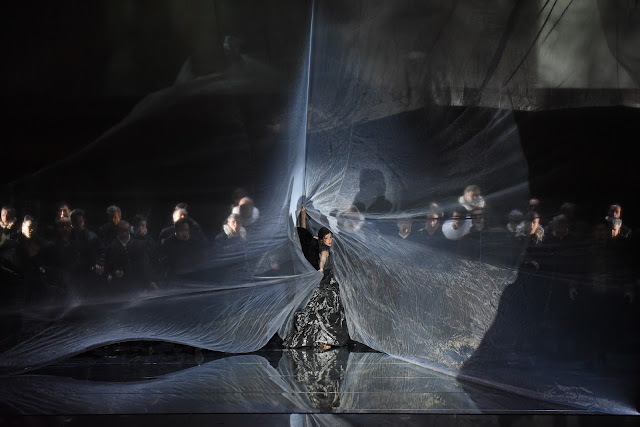Only a couple of days after this performance, the new season
at the Semperoper was announced, in which Christian Thielemann is to conduct
not a single of the new productions. He’s busy with plenty of Wagner (there are
a couple of Rings), as well as a starrily cast Tosca,
but it might seem surprising, after this Otello
and a Simon Boccanegra a few seasons
back, that he wouldn’t have bagsied next season’s new Forza del Destino for himself (that goes to Mark Wigglesworth).
 |
| Sofia Pintzu ('Ein Engel') in the Semperoper's Otello (Photo © Forster) |
 That said, this performance suggested that Forza might not be
quite up his Straße these days. While
he brought an appropriate dark grandeur to Boccanegra
and certain moments in Otello, the
more visceral nature of the latter’s drama seemed on occasion to elude him.
That said, this performance suggested that Forza might not be
quite up his Straße these days. While
he brought an appropriate dark grandeur to Boccanegra
and certain moments in Otello, the
more visceral nature of the latter’s drama seemed on occasion to elude him.
The playing of the Staatskapelle gloried in the band’s characteristic
cushioned sheen, and Thielemann can elicit some thrilling edge and bite from
them too—and certain key orchestral outbursts were stunning in their power. But
it seemed like the conductor also felt the need to place several episodes of
moment by moment drama within longer quasi-symphonic arcs: the results were
always interesting, but not always compelling.
 Perhaps things would have worked more powerfully had the
production, making its Dresden debut after being unveiled at last year’s
Salzburg Easter Festival, been more interested in offering us red-blooded drama
too.
Perhaps things would have worked more powerfully had the
production, making its Dresden debut after being unveiled at last year’s
Salzburg Easter Festival, been more interested in offering us red-blooded drama
too.
Instead, as tends to be the case in my experience of their work, the team
of Vincent Boussard (director), Vincent Lemaire (sets) and Christian Lacroix
(costumes) offered something stylish but slightly anonymous:
period-with-a-modern-twist costumes, shiny dark floor, minimal boxy sets and a
recurring motif of wafting material (a reference both to the sail mentioned in
the opening chorus and Desdemona’s handkerchief) both on stage and in the
atmospheric if slightly screensaverish video projections.
We also had the dubious bonus of an ‘angel’ (played by the
actress Sofia Pintzou), who stalked the stage throughout much of the evening,
and whose black wings started to billow smoke and flame up at the big orchestral outburst ahead of ‘Dio! mi potevi’.
 |
| Dorothea Röschmann (Desdemona), Sofia Pintzu (Angel) and Stephen Gould (Otello) (Photo © Forster) |
This allowed for some impressive images, but also seemed symptomatic of a
staging that felt weirdly reluctant to get its hands dirty with this most
powerful and direct of dramas, in which we had little sense of where we were, who the main
characters were, why they were acting in the way they did and, ultimately, why
we should really care about them.
 |
| Stephen Gould (Otello), Dorothea Röschmann (Desdemona) & Andrzej Dobber (Iago) (Photo © Forster) |
This effect was somewhat exacerbated by a cast that never
really coalesced. The casting of Stephen Gould as Otello seemed to take us back
to an earlier age where Tristans and Siegfrieds were regulars in this role, but
also demonstrated that its challenges are very different from those of Wagner.
Gould was stretched at the extremes and his tone was exposed as short on sap
and the necessary trumpety squillo. He
has the stamina, though, and saved the best till last in a moving death
scene.
Andrzej Dobber was a perfectly decent Iago, but the
combination of his reluctance to really use the words and a smooth, rather
benign timbre held the characterization back.
Dorothea Röschmann was an
unusually forthright, strong-willed Desdemona right from the start, and certainly no mere
shining paragon of female virtue and purity (somewhat in contravention of
Verdi’s own conception of the role). There a couple of rough-edged moments, but
her Willow Song and Ave Maria were a highlight—it’s just a shame that the
characterization was left isolated within the production as a whole.
The singers making up the rest of the cast,
including Antonio Poli’s mellifluous and pleasingly bright-toned Cassio, Georg
Zeppenfeld’s authoritative Lodovico and Christa Mayer’s moving Emilia, were
excellent. There was an awful lot of quality on show, then, but this was an Otello that never really caught fire.
No comments:
Post a Comment